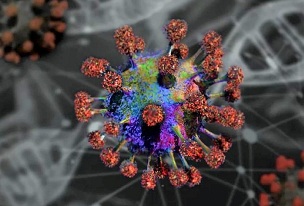COVID-19 Genetics: Yale Led Study Identifies New COVID-19 Related Host Genes That Can Promote Or Inhibit SARS-CoV-2 Infection
Source: COVID-19 Genetics Oct 27, 2020 5 years, 4 months, 7 hours, 27 minutes ago
COVID-19 Genetics : Scientists from Yale University and the Broad Institute of MIT and Harvard screened hundreds of millions of cells exposed to the COVID-19 and MERS viruses and identified dozens of genes that both enable the viruses to replicate in cells and also those that seem to slam the door on the virus.

The study team said that the identification of host genes essential for SARS-CoV-2 infection may reveal novel therapeutic targets and inform our understanding of COVID-19 pathogenesis. The team performed genome-wide CRISPR screens in Vero-E6 cells with SARS-CoV-2, MERSCoV, bat coronavirus HKU5 expressing the SARS-CoV-1 spike, and VSV expressing the SARS-CoV-2 spike. They identified known SARS-CoV-2 host factors including the receptor ACE2 and protease Cathepsin L. They additionally discovered pro-viral genes and pathways including HMGB1 and the SWI/SNF chromatin remodeling complex that are SARS-lineage and pan-coronavirus specific, respectively. The team showed that HMGB1 regulates ACE2 expression and is critical for viral entry of SARS-CoV-2, SARS-CoV-1, and NL63. They also showed that small molecule antagonists of identified gene products inhibited SARS-CoV-2 infection in monkey and human cells, demonstrating the conserved role of these genetic hits across species. Together this identifies potential therapeutic targets for SARS-CoV-2 and reveals SARS-lineage specific and pancoronavirus host factors that regulate susceptibility to highly pathogenic coronaviruses.
According to the study team, both the pro-viral and anti-viral role of these genes will help guide scientists in development of new therapies to combat COVID-19.
The study findings were published in the journal Cell.
https://www.sciencedirect.com/science/article/pii/S0092867420313921
Researchers have previously identified how the SARS-CoV-2 coronovirus, which causes COVID-19, attaches to and invades cells, but less is known about why some cells are more susceptible to infection. Understanding the genetics behind the host cells' susceptibility to infection may help explain why some people exposed to the virus experience few or no symptoms and others become extremely ill or die.
The study team performed a genome-wide screen of a line of green monkey cells, which are more likely to die after exposure to SARS-CoV-2 than commonly used human cell lines. The screens for the first time allowed researchers to simultaneously track interactions of virus and cells. The screens confirmed earlier findings that the ACE-2 gene, which encodes a receptor on the cell surface, promotes infection by SARS-CoV-2.
The screens however also identified two new pro-viral protein complexes and a third, which seems to assist in preventing infection. They found that SWI/SNF complex, which turns genes on and off, and HMGB1, which has a myriad of functions including regulation of inflammation, were linked to increased cell death after infection.
The study team then introduced small molecule drugs that inhibit function of two of the identified gene products and found they could increase survival of cells after infection in a dish.
Significantly by contrast, the histone H3 complex, whic
h helps regulate expression of genes within the cell nucleus, seemed to provide a protective effect, inhibiting ability of SARS-CoV-2 to infect and kill cells.
Dr Craig Wilen, assistant professor in laboratory medicine and immunobiology from Yale University and corresponding author of the study told Thailand Medical News, "It is very important to understand wide variation of responses to COVID-19, for instance why advanced age makes it much more likely that people will die. We have identified both proviral and antiviral genes that may help us predict who is likely to get severely ill and what kind of drugs would be helpful or detrimental in treating patients."
The screen identified many genes with functional roles in chromatin regulation and histone modification which highlight the potential importance of epigenetic regulation of pathogenic coronavirus infection. Epigenetic processes have previously been implicated in regulating antigen presentation and interferon-stimulated gene induction after MERS-CoV and SARS-CoV-1 infection (Menachery et al., 2014, 2018; Schäfer and Baric, 2017); however, given that Vero-E6 cells are type I interferon deficient, distinct mechanism(s) may be at play.
Interestingly, the majority of both proviral and anti-viral genes identified function at the level of viral entry as determined by the high degree of concordance between SARS-CoV-2 and rcVSV-SARS-CoV-2-S screens. The team identified both ACE2 dependent and independent mechanisms regulating coronavirus entry.
Specifically, the study team identied a novel epigenetic role for HMGB1 in regulating ACE2 expression and thus susceptibility to SARS-CoV-1, SARS-CoV-2, and NL63. The team demonstrated this both in Vero-E6 cells and two human IFN-sufficient cell lines. HMGB1 is a pleiotropic protein that binds nucleosomes regulating chromatin in the nucleus, acts as a sentinel of non-self nucleic acids, transports genetic material, and functions as a secreted alarmin in response to virus infection (Menachery et al., 2014; Andersson, Ottestad and Tracey, 2020; Simpson et al., 2020). Interestingly, anti-HMGB1 therapies can reduce respiratory syncytial virus replication and IAV-induced lung pathology in animal models, while in adenovirus infection, the viral protein VII binds HMGB1 and inhibits its proinflammatory functions (Avgousti et al., 2016). Notably, the find that HMGB1 regulates ACE2 expression in a cell-intrinsic manner and not via its function as a cytokine or alarmin, suggesting a distinct mechanism of HMGB1 in SARS-CoV-2 infection.
Dr Wilen noted the information may not only be helpful in current pandemic, but also help prepare for outbreaks of future emerging coronaviruses.
For more on
COVID-19 Genetics, keep on logging to Thailand Medical News.
